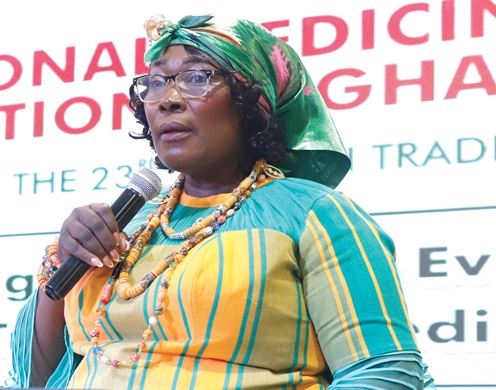The Director of Traditional and Alternative Medicine at the Ministry of Health, Dr Anastasia Yirenkyi, has called for more evidence-based research to support traditional and alternative medicine practice in the country.
She said validating indigenous knowledge through research and regulation would boost public confidence, improve healthcare and create economic opportunities for the country.
Dr Yirenkyi was speaking at the 26th Traditional Medicine Week and 23rd African Traditional Medicine Day celebration in Accra on the theme: “Strengthening the evidence base for traditional medicine.”
In attendance were policymakers, regulators, researchers, the academia and practitioners who reviewed progress, shared experiences and charted a roadmap for the future of traditional medicine.
Significance
Dr Yirenkyi highlighted the vital role of traditional medicine in the nation’s healthcare system, and said that centuries-old practices, passed down through generations had long contributed to community health system for which it remained widely used across the country.
![]()
“This is a sector that has grown steadily over the years, and with proper scientific validation and training, it can reach even greater heights.
“I urge stakeholders to invest in research, capacity building, and stronger regulatory frameworks,” she said.
Dr Yirenkyi traced the evolution of traditional medicine in the country to include the establishment of the Centre for Plant Medicine Research (CPMR) in 1975, the creation of a
Traditional Medicine Coordination Unit in 1991, and its elevation to a directorate in 1999.
She also mentioned key legislations such as the Traditional Medicine Practice Act (2000, Act 575), which regulates and promotes traditional medicine practice.
Dr Yirenkyi said that the Act was under review to include establishment of a Traditional and Alternative Medicine Practice Council to strengthen regulatory oversight and improve standards across the sector.
Evidence-based
Dr Bernard Kofi Turkson of the Kwame Nkrumah University of Science and Technology (KNUST) Department of Herbal Medicine, said strengthening evidence base was critical to integrating traditional medicine into modern healthcare.
He said that about 40 per cent of modern pharmaceuticals were derived from traditional knowledge, citing examples such as quinine, aspirin, vincristine and childhood cancer medications.
Dr Turkson further said that the nation’s indigenous plants, including triptolepis (Ghana pinene), vernonia amygdalina, and moringa oleifera had proven therapeutic properties, adding that “with robust research, these plants can be developed into globally recognised treatments”.
Capacity building
The founder and CEO of COA company, Professor Samuel Ato Duncan, urged practitioners to upgrade their knowledge in modern science.
He also called for continuous training to improve safety, quality and efficacy of traditional medicine products and practices.
Prof. Duncan added that the nation had made significant strides in preserving and promoting traditional medicine, adding that the sector’s future depended on sustained research, stronger regulatory oversight and integration with modern healthcare systems.
“Strengthening evidence base will unlock the full potential of traditional medicine for national development and global recognition,” he said.

